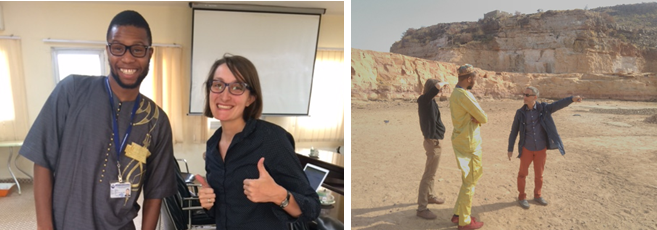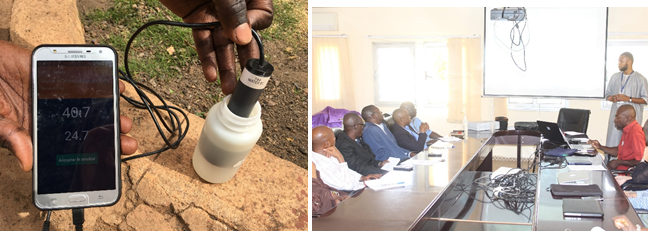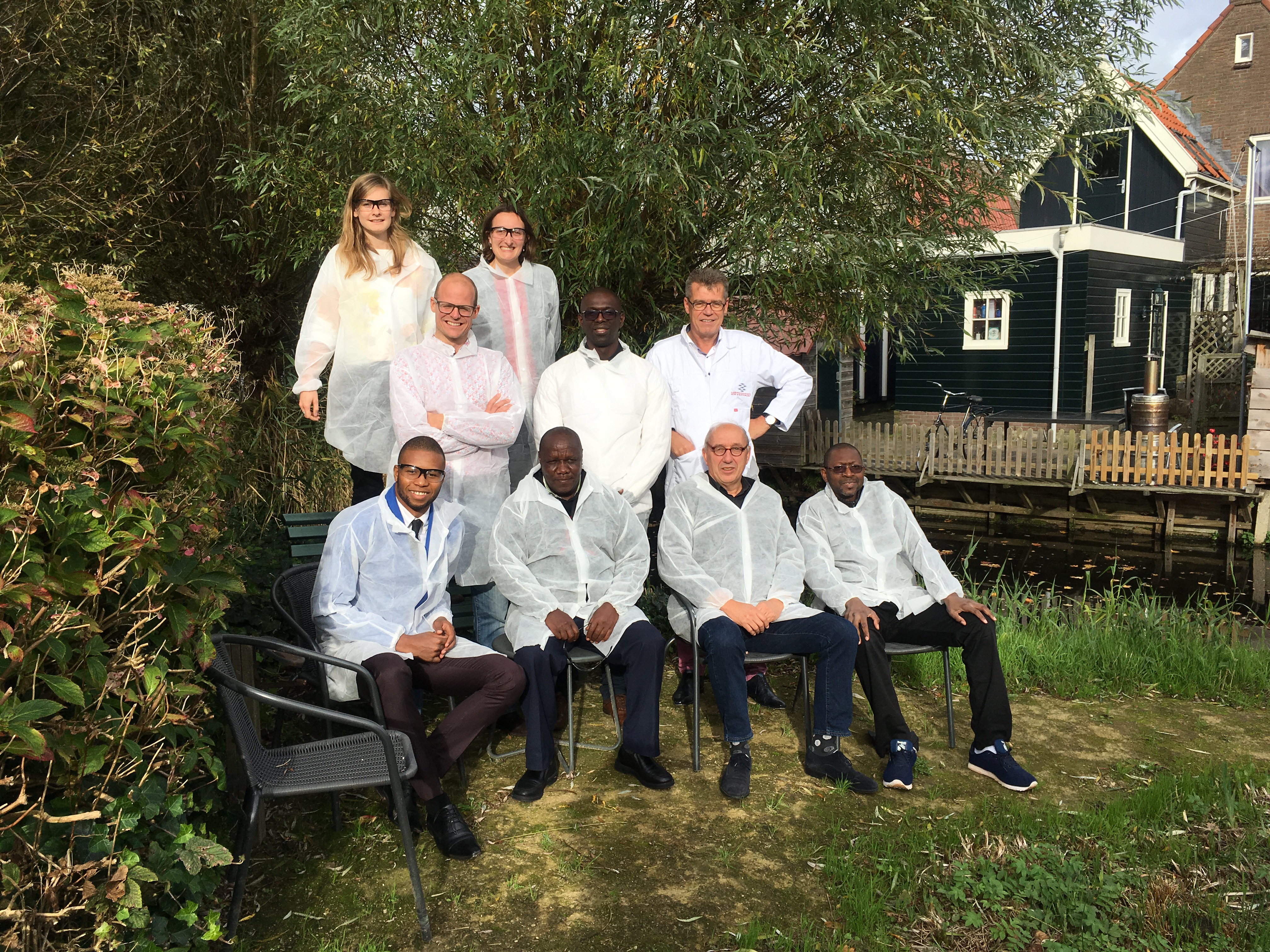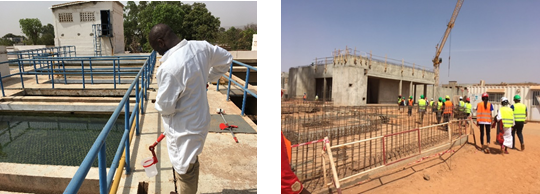Isabel@SOMAGEP
05 March 2018Isabel van Klink is working for World Waternet at our Malian partner SOMAGEP. Find our more about her experiences in Mali.
Every two months, Aboubacar and I will write blog on our work in Bamako, Mali. Here you find the first one from me, Isabel van Klink from Amsterdam. I work as a project coordinator for the Water Operators’ Partnership (WOP) between Waternet and SOMAGEP as part of the Young Expert Program (YEP) for 2 years.
Kick-off
I arrived in Bamako at the beginning of December and I help to implement three projects as part of the WOP: GeoWaQu, ISO certification and the WaterWorX, which I will explain in the following paragraphs. But next to that I had two exiting months here with lots of other things: Koen Maathuis (regional manager of World Waternet for West Africa) visited SOMAGEP together with the FMO (Dutch Development Bank) talking about possible loans. I also met several people for the YEP business case on wastewater treatment and developed a plan. We gave a guided tour to school kids at the treatment plant. I attended a safety and security training with the AKVO team, I participated at the AfWA conference in Bamako and I organized an exchange workshop between SOMAGEP and ANGESEM (wastewater treatment company in Mali, also partnered with the Dutch water sector). Apart from that, I also paid a visit at the Dutch embassy and met up with the other Young Experts from YEP in Bamako and met many many other nice people here!

Aboubacar and I waiting for the directors to join the FMO meeting and us meeting with Protos who are constructing a biogas installation in Bamako.
I measure, therefore I know
And now, a short explanation of my real work here. The GeoWaQu project aims to provide SOMAGEP easier access to water quality data which enables them to obtain better insight into the quality-processes of their drinking water production and distribution systems. Hereby we make use of Akvo Caddisfly, a simple, low cost, open source, smartphone-based water quality testing system connected to an online data platform. Real time GPS-based water quality data of Akvo Caddisfly is shared via Akvo’s data collection platform Akvo Flow. The preparation phase that started since September 2017, which included trainings given by Akvo and a benchmarking visit of SOMAGEP staff to the Amsterdam International Water Week (AIWW). The operation phase started in December with an official launch, just after my arrival, including presentations of SOMAGEP, Akvo, Waternet and Via Water, it was a great success. Since then all points were geo-localized in Bamako and also the first mission to Selingue, Bougouni and Sikasso took place. It is great to be able to collect all the data on a platform. This also makes it possible for the technical expert from Waternet, Jos Hooft, to see in real time what is happening. The only problem is that the test results at Akvo Caddisfly are different than the results from the laboratory, the Akvo and Waternet teams are working on a solution at the moment. For now, we fill both the Caddisfly results and the laboratory results directly into the Akvo Flow app, which gives us the opportunity to have all results on maps and spreadsheets within a few clicks. At the beginning of April, after all cities (that are reachable at the moment) are geo-localized by Akvo-Caddisfly, a mission of Waternet will take place with technical experts on advising to develop the sampling points distribution and the non-conformity response time procedure.

Using Akvo Caddisfly tool in the field and presentation by Aboubacar during the launch.
Improving the lab
The other project, “the ISO project”, aims to help SOMAGEP obtaining ISO 17025 certification by the end of 2019. ISO certification is a lot of work, of which developing and writing down Standard Operative Procedures is taking most time next to the Validation procedures. I mention this project separate because we already started implementing this since May 2017, but since this year it became part of the WaterWorX under water quality. In January we chose a team of 4 people to work on the accreditation, with the head of the laboratory department, Issabre, as the Quality Control Manager. Next to that, there is one person responsible for the Physio-chemical analyses, another one for the bacteriological analyses and one for sampling. Meanwhile Aboubacar went to a ISO certification training in India to really help implementing the project. My task is mainly to communicate with the expert in the Netherlands and help getting the right documents. The idea is that the ISO team will follow a training program with Het Waterlaboratorium and Waterproef in Netherlands. I also started to give English classes two times per week, especially to understand the technical vocabulary. As for now, the work is going well and the team is very enthusiastic! The first document, the procedure to write an SOP, is finished and it seems by next week our first SOP on turbidity will be ready as well!

Visiting Waterproef with the Waternet and SOMAGEP team during their visit at the AIWW
WaterWorX
Apart from those two projects, we started the WaterWorX (WWX) since January 2018. The WWX is a public-private collaboration between the ten Dutch water utilities and 24 partner companies in Africa, Asia and Latin America partly funded by the Netherlands' Ministry of Foreign Affairs. WaterWorX aims to increase sustainable access to drinking water by 10 million people in 2030. The WWX at SOMAGEP is implemented by Waternet and focuses mainly on strengthening the company on organizational level, working on NRW and maintenance and obtaining pro-poor connections. This focus is important because of two major changes for SOMAGEP since 2017. Firstly, they have attracted multiple donor-funding to realize major infrastructural improvements and extensions. The Kabala project for example will double production in Bamako. Secondly, the Direction National Hydraulique (DNH) started with transferring the management of over 56 smaller systems to SOMAGEP. This means SOMAGEP will soon be active in over 70 cities and towns (instead of the current 18!). As this is really the beginning of the program, we did mainly preparation work for now. For example, we appointed a project leader from SOMAGEP, Abdul Aziz Traore, who is the director of the HR department. Also the pro-poor coordinator was appointed and some other people who will help to implement the program. At the AfWA conference I met many other organizations that have experience in the same field or work with SOMAGEP, so coming weeks we will also meet with them and discuss possible collaboration. Several missions of Waternet staff is planned for the coming year to give trainings or develop improvement plans. I am very eager to coordinate this program because it is very interesting and variable.

Working on improvement of sampling at the plant for ISO certification and visit to the new Kabala plant during the AfWA
Having a good time
As for now, after 2,5 months living and working in Bamako I am very satisfied. The work is very nice and my colleagues are just great, I was very surprised about the efficiency at SOMAGEP and their willingness to reach future goals. Malians are very nice people, everyone starts their conversation with “Bonjour, ca va? Et la famille?” etc. which feels very welcoming. They also accept that my French is not so perfect and they wait patiently for me to finish my sentences and attempt to understand what I try to say. This also gives me more confidence so that I am talking in French more often, so hopefully I will be fluent in several months. We are now also settled down in the house which took some time, because the people outside of SOMAGEP are definitely less efficient. I am very happy with the house and the location, because of the great weather during the last months (between 20-25 degrees), I walked every morning along the river for 12 minutes to work. I was happy I didn’t have to deal with the taxi drivers every day, because I don’t like to bargain every day. I recently got a bicycle and a car, which makes everything much easier here. I also enjoy the great music here and have been to several concerts already. This week my family is coming to visit and we will visit some other cities around, which I am very much looking forward to!